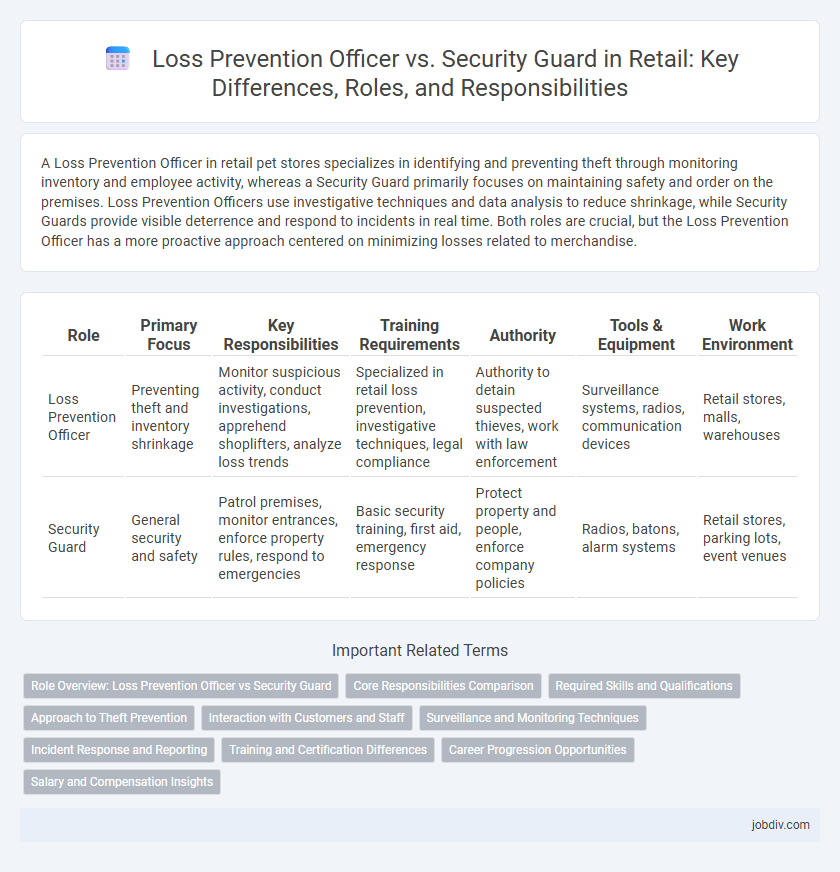A Loss Prevention Officer in retail pet stores specializes in identifying and preventing theft through monitoring inventory and employee activity, whereas a Security Guard primarily focuses on maintaining safety and order on the premises. Loss Prevention Officers use investigative techniques and data analysis to reduce shrinkage, while Security Guards provide visible deterrence and respond to incidents in real time. Both roles are crucial, but the Loss Prevention Officer has a more proactive approach centered on minimizing losses related to merchandise.
Table of Comparison
| Role | Primary Focus | Key Responsibilities | Training Requirements | Authority | Tools & Equipment | Work Environment |
|---|---|---|---|---|---|---|
| Loss Prevention Officer | Preventing theft and inventory shrinkage | Monitor suspicious activity, conduct investigations, apprehend shoplifters, analyze loss trends | Specialized in retail loss prevention, investigative techniques, legal compliance | Authority to detain suspected thieves, work with law enforcement | Surveillance systems, radios, communication devices | Retail stores, malls, warehouses |
| Security Guard | General security and safety | Patrol premises, monitor entrances, enforce property rules, respond to emergencies | Basic security training, first aid, emergency response | Protect property and people, enforce company policies | Radios, batons, alarm systems | Retail stores, parking lots, event venues |
Role Overview: Loss Prevention Officer vs Security Guard
Loss Prevention Officers specialize in minimizing retail shrinkage by monitoring customer activity, investigating theft incidents, and implementing loss reduction strategies. Security Guards primarily focus on maintaining overall safety by patrolling premises, controlling access points, and responding to emergencies. Both roles collaborate to protect assets but differ in their proactive approaches and specific responsibilities within the retail environment.
Core Responsibilities Comparison
Loss Prevention Officers specialize in identifying and mitigating internal theft, employee dishonesty, and inventory shrinkage through investigative techniques and surveillance systems. Security Guards primarily focus on maintaining a visible deterrent against external threats, enforcing property access controls, and responding to emergencies or disturbances on-site. Both roles contribute to retail safety, but Loss Prevention Officers emphasize proactive asset protection and internal risk management, while Security Guards prioritize public safety and physical security.
Required Skills and Qualifications
Loss Prevention Officers require specialized skills in retail analytics, inventory management, and investigative techniques to identify and mitigate theft risks effectively. Security Guards prioritize qualifications such as physical fitness, surveillance expertise, and emergency response training to maintain safety and order within the retail environment. Both roles benefit from strong communication skills and knowledge of legal regulations governing loss prevention and security protocols.
Approach to Theft Prevention
Loss Prevention Officers utilize advanced investigative techniques, data analysis, and staff training to proactively prevent theft and minimize shrinkage in retail environments. Security Guards primarily focus on visible deterrence through regular patrols, monitoring surveillance systems, and responding to suspicious activities in real-time. The Loss Prevention Officer's strategic and analytical approach complements the Security Guard's direct physical presence to create a comprehensive theft prevention strategy.
Interaction with Customers and Staff
Loss Prevention Officers maintain a proactive approach by engaging with customers and staff to identify suspicious behavior while fostering a secure shopping environment. Security Guards primarily focus on visible deterrence and immediate response, interacting with customers and staff to enforce store policies and provide assistance. Both roles require strong communication skills, but Loss Prevention Officers emphasize discreet observation and collaboration with employees to prevent theft and losses.
Surveillance and Monitoring Techniques
Loss Prevention Officers utilize advanced surveillance technologies including CCTV systems combined with behavioral analysis to detect and prevent theft in retail environments. Security Guards primarily conduct physical patrols and monitor entry points, relying on visibility and rapid response to deter shoplifting and vandalism. Integrating digital monitoring tools with on-ground security personnel enhances overall retail loss prevention effectiveness.
Incident Response and Reporting
Loss Prevention Officers specialize in incident response within retail environments, employing advanced techniques to identify, apprehend, and report theft or fraud effectively, ensuring accurate documentation for legal use. Security Guards primarily focus on maintaining overall premises security and deterring potential threats but may lack the specialized training in detailed incident reporting critical for loss prevention. Detailed incident reports created by Loss Prevention Officers are essential for retail management to analyze patterns, improve security measures, and collaborate with law enforcement efficiently.
Training and Certification Differences
Loss Prevention Officers undergo specialized training in retail fraud detection, shrink management, and legal aspects of theft prevention, often earning certifications such as Certified Loss Prevention Professional (CLPP). Security Guards typically receive broader, less retail-focused training, with certifications centered on general safety, emergency response, and basic surveillance. The distinction in training and certification highlights the Loss Prevention Officer's role in proactive theft deterrence versus the Security Guard's emphasis on maintaining overall security presence.
Career Progression Opportunities
Loss Prevention Officers in retail typically have more specialized career progression opportunities, advancing to roles such as Loss Prevention Manager, Regional Security Manager, or Risk Management Specialist due to their focus on theft reduction and internal investigations. Security Guards often have a more limited upward trajectory within retail, primarily advancing to senior security roles or facility security management without the investigative or analytical responsibilities. The distinct skill sets of Loss Prevention Officers, including data analysis, employee training, and technology use, position them for broader managerial and strategic career paths compared to the more operational tasks of Security Guards.
Salary and Compensation Insights
Loss Prevention Officers in retail typically earn higher salaries than Security Guards, reflecting their specialized training in theft deterrence and inventory protection. According to industry data, the average annual salary for Loss Prevention Officers ranges between $40,000 and $60,000, whereas Security Guards usually earn between $25,000 and $40,000. Compensation packages for Loss Prevention roles often include performance bonuses and benefits such as health insurance and retirement plans, enhancing their overall compensation compared to standard security positions.
Loss Prevention Officer vs Security Guard Infographic

 jobdiv.com
jobdiv.com